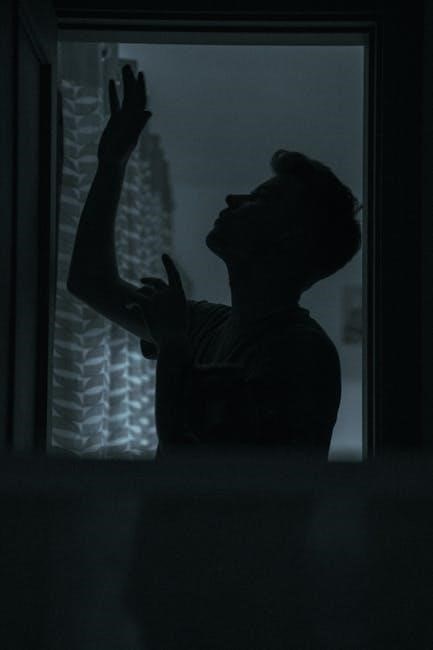Chapter 3 of Night marks a pivotal moment in Eliezer’s journey, detailing his arrival at Auschwitz-Birkenau and the horrific separation from his mother and sisters․ The chapter introduces Dr․ Mengele and explores Eliezer’s moral struggles, including his decision to lie about his age to survive․ The events described underscore the brutality of the Holocaust, forcing Eliezer to confront the loss of innocence and faith․ This section sets the tone for the emotional and psychological toll of the camps, highlighting the resilience needed to endure unimaginable atrocities․
1․1 Overview of the Chapter’s Significance
Chapter 3 of Night is pivotal as it captures Eliezer’s arrival at Auschwitz-Birkenau, detailing the harrowing separation from his family and the initial encounter with Dr․ Mengele․ The chapter underscores the moral dilemmas Eliezer faces, such as lying about his age to survive, and sets the stage for his internal struggles with faith and humanity․ It vividly portrays the brutality of the Holocaust, marking a turning point in Eliezer’s loss of innocence and his desperate fight to survive amidst unimaginable horrors․
1․2 Key Themes Explored in Chapter 3
Chapter 3 delves into themes of survival, moral compromise, and the erosion of humanity․ Eliezer’s decision to lie about his age and occupation highlights the desperate measures taken to survive․ The separation of families and the encounter with Dr․ Mengele emphasize the dehumanizing nature of the camps․ The chapter also explores the loss of innocence and faith, as Eliezer witnesses unimaginable atrocities, forcing him to confront the harsh realities of existence in Auschwitz-Birkenau․

Major Events in Chapter 3
The separation of men and women, Eliezer’s lie about his age, and his first encounter with Dr․ Mengele are central to the chapter’s narrative․
2․1 The Separation of Men and Women
The separation of men and women upon arrival at Auschwitz-Birkenau is a heart-wrenching event in Chapter 3․ Eliezer is forcefully parted from his mother and sisters, witnessing the chaos and despair as families are torn apart․ This separation signifies the dehumanizing nature of the Holocaust, stripping individuals of their familial bonds and reducing them to mere numbers․ The scene vividly portrays the terrified faces and the unbearable screams of those being separated, leaving an indelible mark on Eliezer’s psyche․
2․2 Eliezer’s Lie About His Age and Occupation
Eliezer lies about his age and occupation to survive, claiming he is a farmer rather than a student․ This decision is driven by the advice of fellow prisoners, who warn that younger boys and those unable to work are sent to the crematorium․ The lie underscores the moral dilemmas faced in the camps, where deception becomes a necessary tool for survival․ Eliezer’s choice reflects the harsh realities of the Holocaust, where truth is distorted to endure unimaginable horrors․
2․3 The First Encounter with Dr․ Mengele
Eliezer’s first encounter with Dr․ Josef Mengele, the infamous “Angel of Death,” occurs during the initial selection process at Auschwitz-Birkenau․ Mengele, known for his cruel experiments, assesses prisoners’ fitness for work․ His intimidating presence and arbitrary decisions instill fear and hopelessness․ Eliezer witnesses Mengele’s merciless judgment, where a mere gesture determines life or death․ This encounter underscores the brutality of the Holocaust and the dehumanizing power dynamics within the camp, leaving a lasting impression on Eliezer’s perception of humanity and survival․

Eliezer’s Internal Struggles
Eliezer grapples with profound moral and emotional turmoil, questioning his faith and identity․ The harsh realities of the camp force him to confront survival instincts versus ethical dilemmas․
3․1 The Moral Dilemma of Lying to Survive
Eliezer faces a moral dilemma when he lies about his age and occupation to survive․ He claims to be a farmer instead of a student, fearing that admitting his youth and inexperience would lead to immediate death․ This decision, though necessary for survival, burdens him with guilt, challenging his ethical beliefs and highlighting the harsh choices forced upon victims in the concentration camps․ This act of deception becomes a pivotal moment in his struggle to maintain humanity amidst inhumanity․
3․2 The Loss of Innocence and Faith
Chapter 3 marks Eliezer’s profound loss of innocence and faith as he witnesses unimaginable atrocities, including the burning of children․ The separation from his mother and sisters, coupled with the dehumanizing conditions, shakes his belief in a just God․ The encounter with Dr․ Mengele and the brutal efficiency of the camp’s operations leave Eliezer questioning the existence of divine justice․ This emotional and spiritual upheaval underscores the irreversible loss of his youthful naivety and trust in a benevolent universe, reshaping his worldview forever․
Key Questions and Answers
Chapter 3 of Night raises critical questions about survival, morality, and humanity․ Eliezer’s experiences, including his lie about his age and witnessing atrocities, spark deep reflections on faith and hope, offering insights into the psychological and emotional toll of the Holocaust․
4․1 What Did Eliezer Witness While Standing in Line?
Eliezer witnessed the harrowing separation of men and women, the brutal selection process by Dr․ Mengele, and the horrific burning of children in a ditch; These atrocities deeply traumatized him, shaking his faith and innocence, as he realized the unimaginable cruelty of the Holocaust․ The scenes of suffering and death left an indelible mark on his psyche, highlighting the inhumanity of the concentration camps․
4․2 How Did Eliezer React to the Burning of Children?
Eliezer was deeply traumatized by witnessing the burning of children in a ditch near Dr․ Mengele․ This horrific scene shattered his faith in humanity and God, leaving him in emotional turmoil․ The brutality of the act made him question the existence of divine justice, intensifying his internal struggle with belief․ The sight of innocent lives being destroyed filled him with despair, marking a turning point in his loss of innocence and spiritual identity․

The Role of Other Prisoners
Fellow inmates advised Eliezer to lie about his age and occupation, crucial for survival․ Their guidance helped him navigate the harsh realities of the camp․
5․1 The Inmate’s Advice to Lie About Their Ages
An inmate immediately advised Eliezer and his father to lie about their ages, urging them to claim strength and experience․ This advice was crucial for survival, as the Nazis often sent younger, weaker individuals to their deaths․ Eliezer, though initially hesitant, followed the guidance, falsely stating his age and occupation․ This act of deception, while morally conflicted, became a necessary strategy to endure the brutal conditions of the camp and avoid immediate peril․
5․2 The Impact of Fellow Prisoners’ Reactions
Fellow prisoners’ reactions played a significant role in shaping Eliezer’s actions and mindset․ Their advice to lie about his age and occupation, though morally challenging, became a lifeline․ Witnessing others’ fear and resilience influenced his resolve to survive․ The collective trauma and instinct to endure created a bond among prisoners, yet also highlighted the harsh realities of their situation․ These interactions underscored the psychological toll of the Holocaust and the difficult choices required to survive․

The Transport to Birkenau
The transport to Birkenau marked the beginning of Eliezer’s exposure to the harsh realities of the concentration camp․ The camp’s name symbolized terror and mass extermination, while his first impressions revealed the grim conditions and overwhelming sense of dread that defined life within the camp․
6․1 The Significance of the Camp’s Name
The name “Birkenau” carries profound significance, symbolizing the brutal reality of mass extermination and terror․ It evokes dread, as the camp was notorious for its role in the Holocaust․ The mere mention of Birkenau conjures images of systematic murder, reflecting the horrors Eliezer witnessed; The camp’s name became synonymous with the loss of humanity and faith, deeply impacting Eliezer’s perspective and reinforcing the atrocities he endured․
6․2 Eliezer’s First Impressions of the Camp
Eliezer’s first impressions of Birkenau were marked by horror and disbelief․ The sight of the crematorium chimneys and the smell of burning bodies filled him with dread․ Chaos and confusion surrounded him as he witnessed the brutal separation of families․ The camp’s dehumanizing environment shattered his illusions of humanity, leaving him in a state of moral and emotional turmoil; The initial encounter with the camp’s atrocities deeply scarred his psyche, symbolizing the end of his innocence and faith in a just world․
The Aftermath of Separation
The separation from his mother and sisters left Eliezer with profound emotional scars, intensifying his feelings of helplessness and despair in the camp․
7․1 Eliezer’s Separation from His Mother and Sisters
Eliezer’s separation from his mother and sisters occurs during the chaotic arrival at Auschwitz-Birkenau․ The SS officers forcibly divide men from women, leaving Eliezer with his father․ The emotional toll is immense as he witnesses his mother and sisters being led away, never to be seen again․ This moment marks a devastating loss of family and innocence, deeply affecting Eliezer’s faith and sense of identity․ The separation underscores the brutal efficiency of the Nazi regime’s genocidal machinery․
7․2 The Emotional Toll of the Separation
The separation from his mother and sisters leaves Eliezer overwhelmed with grief and helplessness․ Witnessing their forced departure, he grapples with survivor’s guilt and the loss of familial bonds․ This traumatic event erodes his faith in humanity and God, intensifying his internal conflict․ The emotional toll manifests as a profound sense of abandonment and despair, reshaping his worldview and haunting him long after the immediate horror subsides․ The psychological scars of this separation linger, deeply impacting his identity and hope for survival․
The Role of Hope and Survival
Hope sustains Eliezer and his father amidst unimaginable atrocities, fueling their instinct to survive․ It becomes their lifeline, ensuring perseverance despite overwhelming despair and anguish․
8․1 How Hope Sustains Eliezer and His Father
Hope acts as a vital lifeline for Eliezer and his father, providing them with the strength to endure the unimaginable horrors of the concentration camp․ Despite the brutal separation from their family and the constant threat of death, their mutual resolve to survive keeps their spirits afloat․ This fragile thread of hope enables them to cling to the possibility of a future beyond the camps, even when faced with the most dehumanizing conditions․ It becomes their ultimate source of resilience and determination․
8․2 The Instinct to Survive Despite Atrocities
The instinct to survive becomes Eliezer’s primal force amid the camp’s horrors․ Despite witnessing unimaginable atrocities, including the burning of children, he finds the strength to persevere․ The harsh reality of the camp environment forces him to prioritize survival over moral dilemmas, driving him to lie about his age and adapt to the brutal conditions․ This instinct becomes his only solace, pushing him to endure the unbearable and cling to life, even as hope seems lost in the darkness of the Holocaust․
The Long-Term Impact of Chapter 3
Chapter 3 profoundly shapes Eliezer’s perspective, illustrating the destruction of innocence and faith․ Its vivid depiction of atrocities leaves a lasting psychological impact, underscoring the memoir’s haunting relevance․
9․1 How Chapter 3 Shapes Eliezer’s Perspective
Chapter 3 drastically alters Eliezer’s worldview, as he witnesses unimaginable horrors, including the separation from his mother and sisters․ The encounter with Dr․ Mengele and the sight of burning children erode his faith, leaving him feeling abandoned by God․ His decision to lie about his age reflects a shift toward survival instincts, highlighting the moral dilemmas imposed by the Holocaust․ These experiences forge a profound sense of loss and resilience, reshaping his perspective on humanity and divine justice, leaving an indelible mark on his identity and understanding of the world․
9․2 The Chapter’s Relevance to the Overall Narrative
Chapter 3 is central to the memoir, as it establishes the harsh realities of the Holocaust and sets the tone for Eliezer’s psychological and emotional journey․ The separation from his family, the first encounter with Dr․ Mengele, and the witnessing of unspeakable atrocities lay the foundation for his struggle with faith and humanity․ These events underscore the themes of survival, moral compromise, and the destruction of innocence, making Chapter 3 pivotal in understanding Eliezer’s transformation and the broader narrative of Night․